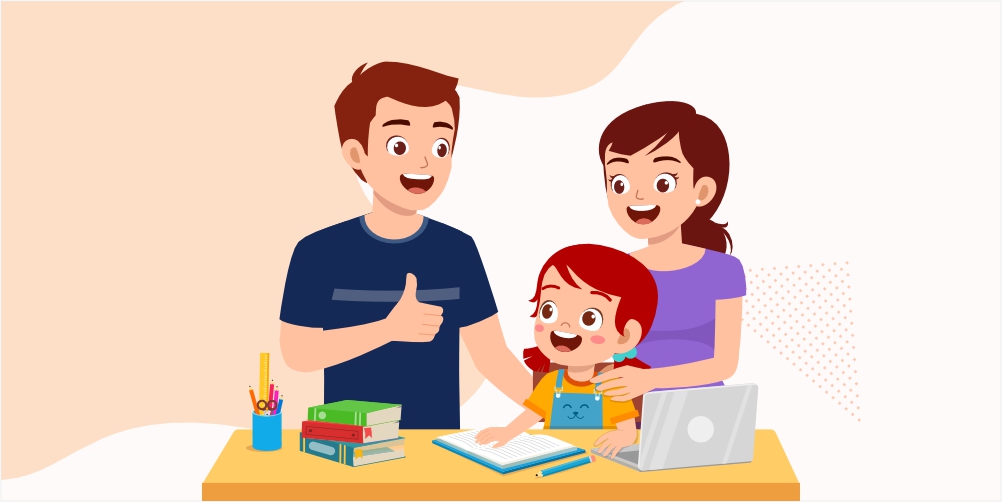Praising your child can be a surprisingly effective technique that you, as a parent, can use for your child’s positive growth. It helps you connect with your child and also encourages them to be at their best. Praise technique for children, if correctly used, can help you improve your child’s behaviour in a desired manner, bringing out the best in them. Today we will discuss how parents can try improving children’s behaviour through praise.
Why use praise technique for children?
Young children generally have the tendency to want to please their parents and do well. When you praise your child, it motivates them to willingly continue the same behavior. It carries much more power than when parents scold their children to make them behave. Yelling at your child may keep them in line, but they would listen to you out of fear and not willingness.
How to effectively use the praise technique for children?
You can implement several behavioural strategies for kids, but if you do not understand the right way to use them, it might not give you the desired results.
Here are some tips on how you can use praise to discipline your child:
● Praise specific actions

Instead of waiting to praise your child for a general behaviour or outcome, praise them for actions and behaviours you want to see more of. It helps them understand what you expect of them. For example, if your child has behaved well throughout the day, instead of telling them they have been a good kid all day, tell them things like, “I really liked how you ate all your vegetables today and did not waste any food.”
● Be enthusiastic about it

Once you know what behaviour to praise, add some enthusiasm to it. Half-hearted praises do not bring the desired results, but when you are enthusiastic about it, younger children in particular take it more positively. Adding phrases like “good job!” or “well done” can add more effect to it.
● Keep your praise positive
The purpose of praising your child is to add positive changes to their behaviour. Adding negative comments to the praise won’t help you see positive changes. Behavioural rewards for children don’t work if you add criticism to them because it takes away the positive effect of the praise. Saying, “I am happy you didn’t cry for the race car” won’t have such an effect as when you say “I’m proud of how happy you were even when we didn’t get the race car.”
● Praise immediately

Instead of waiting to praise your child for a specific behaviour or outcome, do it immediately. It carries more influence because your child is still in that headspace and would receive the praise more positively.
● Praise their efforts, not the result
If your child scores good marks in exams, praise them for the effort they put in their studies and not the grades they achieved. Praising them for their grades undermines their efforts. It can also condition them to believe that they don’t deserve praise if they can’t score good marks. Remember, the outcome is not something in your child’s control, but their behaviour is.
● Add non-verbal gestures
Motivating children through praise can become more effective with gestures like hugging your child, or smiling at them. Physical contact such as patting their back or hugging them makes them feel loved and validated. It also reinforces your words of praise in their heart. Use them as and when possible to create a safe environment for your child.
● Keep the praise genuine
When you tell your child things like “you are the best athlete in your school,” it might encourage them, but also makes them scared of failure. A child needs to understand that failing is a part of life and they should not fear it. Therefore, try to keep your praise genuine and instead tell them “You are a very good athlete.” This makes it easier for your child to accept negative outcomes much more positively.
Conclusion
Using praise techniques with children helps them improve their self-confidence and have a more positive view of themselves. Whereas children who are often scolded can become self-conscious and lose their confidence. However, you must also remember that moderation is the key. Overdoing or underusing praise won’t give you the desired results. So, once you start seeing positive changes in your child, you may also want to reduce the frequency of your praise. With consistent efforts and making your child feel loved and safe, you can start seeing positive results in a short span of time.
To stay updated about all the important information from the Narayana Educational Institutions, Join our Telegram channel: https://t.me/narayanaeducationalinstitutions

Good
Very good thinking every student following
I thank the management for giving useful valuable information to bring my ward in a good way
Good information . Thank you
Nice inputs
Very useful and essential information
Thank you
Very useful tips.
I am going to implement for both my daughters.
I could imagine how effective this will be.
Looking for more such tips to grow the children
Nice one thank you for sharing.
Thank you for giving this type of announcements. These are all praise techniques followed by my child’s.
Very useful and essential information for parents
character plays a vital role for every children to improve their endurance, patience and self confidence. Our positive approach may help their confidence and motivate them in all aspects.
Thank you mam/sir
Thnku for the msg.
Good information
Thank you sir
Nice information
Very good